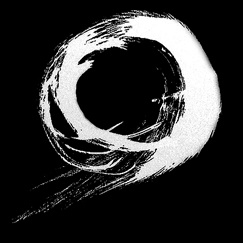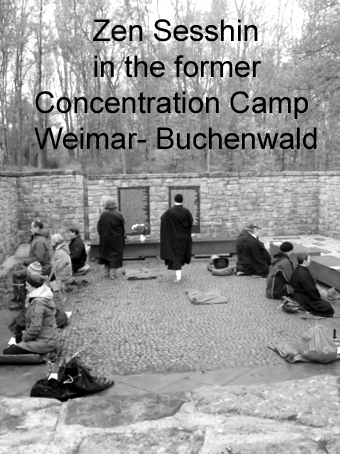
BuddhaWeg-Sangha
Mitglied der Association Bouddhiste Zen d'Europe
Mitglied der Deutschen Buddhistischen Union
Construction of Buchenwald concentration camp began in 1937 several kilometers north of Weimar, a city associated with the names of Cranach, Goethe, Schiller, Bach, Liszt, Gropius, Kandinsky, Klee. Initially the camp was intended for political opponents of the Nazi regime, previously convicted criminals, ”antisocial” men, Jews, Jehovah Witnesses, and homosexuals. At the start of World War II, people from the Soviet Union, France, Italy, Belgium, Luxembourg, the Netherlands, Norway, and Denmark were brought there. At the beginning of 1945 the camp was the end of the line for evacuation transports out of the extermination camp Auschwitz.
Unlike Auschwitz, Buchenwald was not an extermination camp. Prisoners were forced to do slave labour, and many were worked to death. Prisoners also died of malnutrition and disease, as well as from medical experiments or at the whim of the SS. All in all, 250,000 people were imprisoned, of whom more than 50,000 died.
In Buchenwald more than 8,000 Soviet prisoners of war were executed by special units of the SS upon orders of the supreme command of the Wehrmacht. When units of the US 3rd Army arrived on April 11, 1945, the SS fled and the prisoners opened the camp from the inside. Between August 1945 and February 1950 Soviet security forces used part of the camp. Nearly 30,000 people were imprisoned, of whom more than 7,000 died.
At this place of suffering and dying, but also of hope and resistance we will sit in Zazen, the posture in which the Buddha realized awakening. Sitting in silence at this place doesn’t mean to ignore what has happened here – and what still happens in other forms elsewhere. Being silent allows us to go beyond all categories and to touch our true nature, Buddha-Nature.
We will work at the site of the former camp, have Buddhist ceremonies and recite texts of the Soto-Zen-Tradition.
There will be time to learn more about the history of Buchenwald and time to share the feelings and thoughts we have.
We sincerely invite you to take part in the sesshin at Weimar-Buchenwald!
Heinz-Jürgen Metzger und Ines Steggewentze

|
Beginning:
|
Wednesday, October 4, 2023, 6 pm
|
|
End: |
Sunday, October 8, 2023, 11 am
|
|
Led by: |
Heinz-Jürgen Metzger and Ines Steggewentze Heinz-Jürgen Metzger started to practice zazen in 1985. In 1987 he took the bodhisattva vows. In 1991 he was ordained monk by master Roland Yuno Rech, who gave him shiho in 2010. Since 1996 Heinz-Jürgen Metzger was many times member of the spiritholder group of the Auschwitz-Retreat, founded by the American zen-master Bernie Glassman. In 2011 Heinz-Jürgen Metzger received recognition as zen-teacher by Bernie Glassman. Heinz-Jürgen Metzger is spiritual director of BuddhaWeg-Sangha.
Ines Steggewentze started to practice zazen in 2000, took the bodhisattva vows in 2002 and was ordained nun by Roland Yuno Rech in 2006. Since the first sesshin in Weimar-Buchenwald (2001) she participated in different functions in the sesshin and was pivotal in its development. In 2021, Ines Steggewentze received Dharma-Transmission from Heinz-Jürgen Metzger. She is head of the Robashin-Dojo Solingen.
|
|
Accommodation: |
Single-, Double-, Triple-Rooms.
- Rooms are assigned upon receipt of registration. Jugendbegegnungsstätte Buchenwald D-99427 Weimar Germany Fon: 0049-3643-430190
|
|
Meals: |
The meals served during the retreat will be vegetarian.
|
|
Fee: |
255.- € (Accommodation and meals 170.- €, organisation 85.- €)
|
|
Donation: |
The fees (255.- €) cover the costs of the sesshin, but do not include any financial support for Heinz-Jürgen Metzger and Ines Steggewentze. Please consider an additional donation on their behalf. Thank you!
|
| Registration form | |
| Please register before | September 10, 2023 |